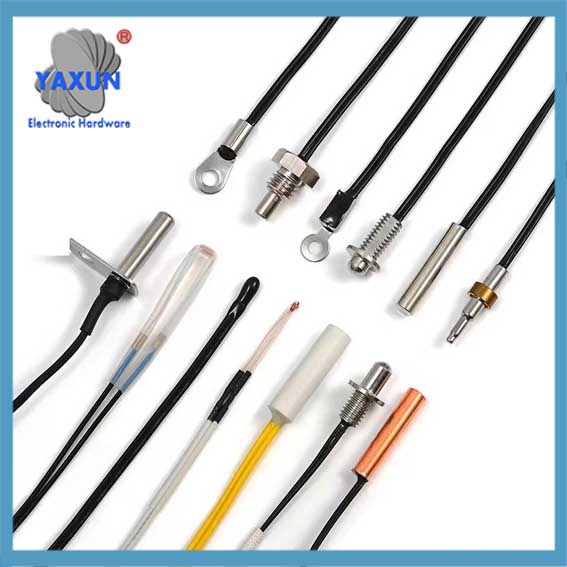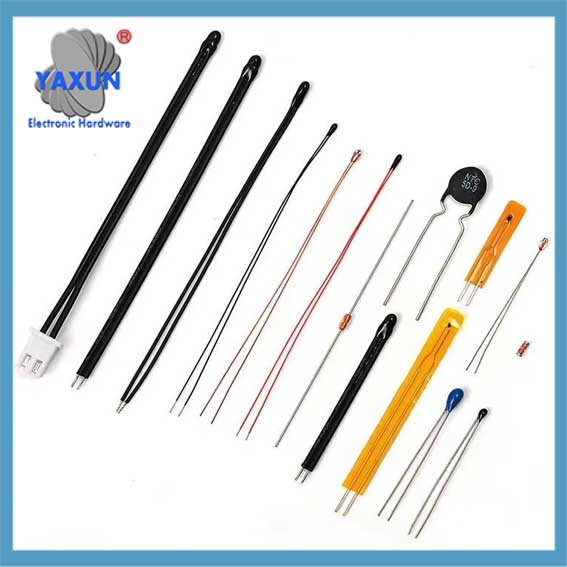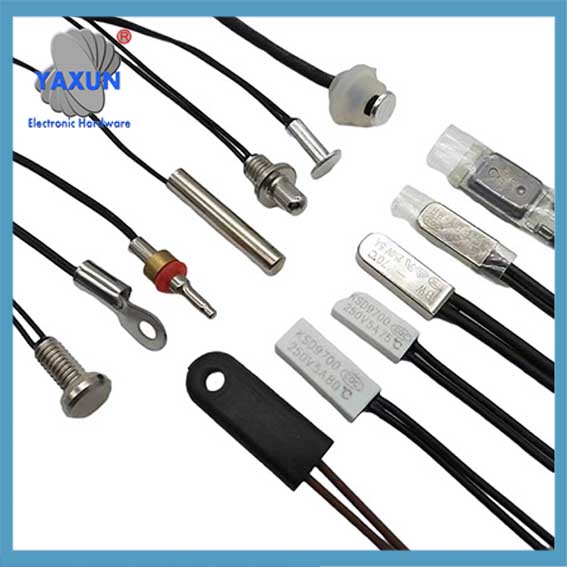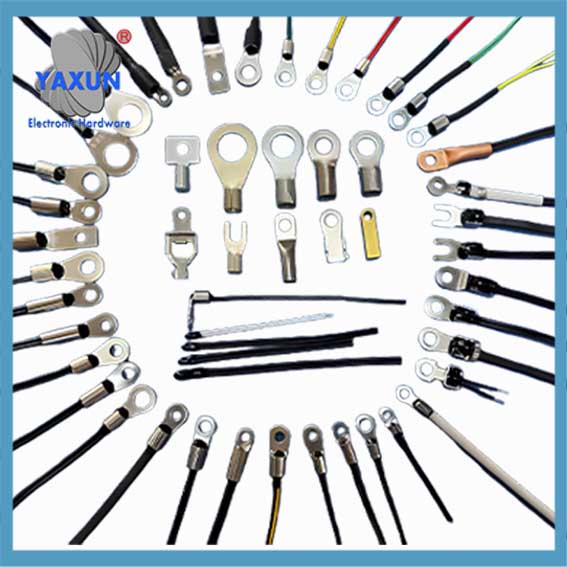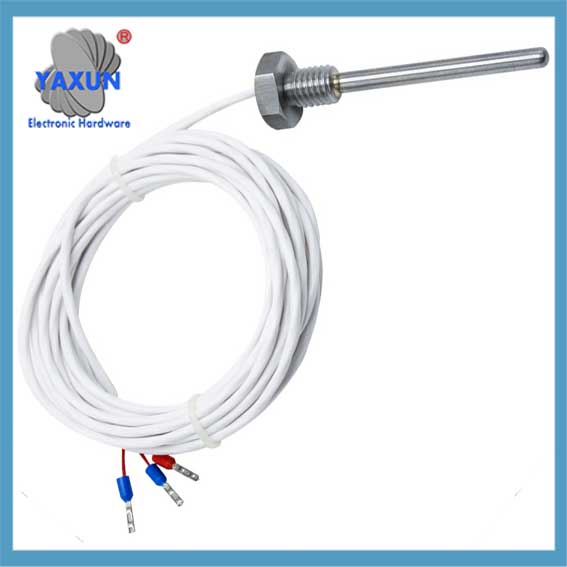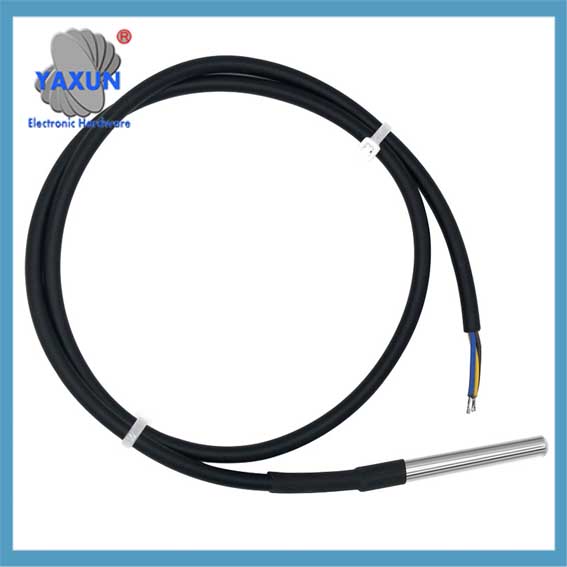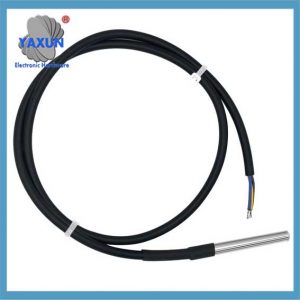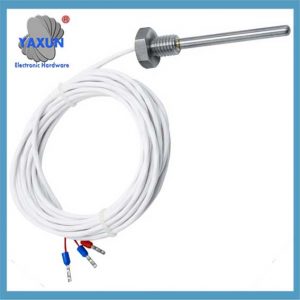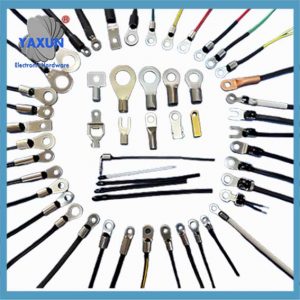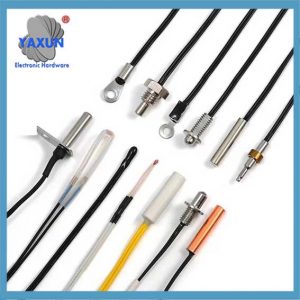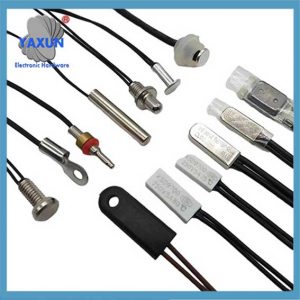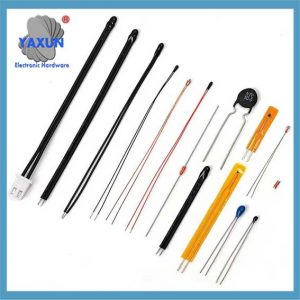หมวดหมู่สินค้า
- ฟิวส์ความร้อน 32
- ฟิวส์ยึดพื้นผิว 12
- เทอร์มิสเตอร์ 36
- ตัวยึดฟิวส์ PCB Mount 27
- ชุดสายไฟ 6
- ตัวยึดฟิวส์ใบมีด 17
- เทอร์โมสตัท 50
- ฟิวส์ไฟฟ้า 24
- เซ็นเซอร์อุณหภูมิยานยนต์ 7
- เบรกเกอร์ความร้อน 22
- ที่ยึดกล่องฟิวส์ 36
- เซ็นเซอร์อุณหภูมิ 75
- สวิตช์ความร้อน 68
- ฟิวส์รถยนต์ 20
- สลักเกลียวลงฟิวส์ 8
แท็กสินค้า
หัววัดอุณหภูมิ, ประเภทของเซนเซอร์วัดอุณหภูมิ & การใช้งาน
หัววัดอุณหภูมิเป็นอุปกรณ์ที่ใช้ในการวัดอุณหภูมิ, มักประกอบด้วยองค์ประกอบที่ละเอียดอ่อนและวงจรการวัด. องค์ประกอบที่ละเอียดอ่อนสามารถเป็นเทอร์โมคัปเปิลได้ (pt100, pt1000), ตัวต้านทานความร้อน (กทช, พีทีซี), เซมิคอนดักเตอร์ (DS18B20 ดิจิตอล), ฯลฯ, ซึ่งสามารถแปลงการเปลี่ยนแปลงของอุณหภูมิให้เป็นสัญญาณไฟฟ้าได้. จากนั้นก็จะขยายออกไป, กรองแล้ว, แปลงแล้ว, และประมวลผลโดยวงจรวัด, และสุดท้ายก็มีสัญญาณไฟฟ้าที่แปรผันตามอุณหภูมิออกมา.
โพรบอุณหภูมิและเซ็นเซอร์อุณหภูมิเป็นอุปกรณ์ที่แตกต่างกันสองตัว, และพวกเขามีลักษณะของตัวเองและสถานการณ์การใช้งานในการวัดอุณหภูมิ.
โพรบอุณหภูมิ
ก “โพรบอุณหภูมิ” เป็นเซ็นเซอร์ที่ใช้วัดอุณหภูมิโดยการแปลงพลังงานความร้อนเป็นสัญญาณไฟฟ้าที่วัดได้, และเซ็นเซอร์อุณหภูมิที่พบบ่อยที่สุดภายในโพรบรวมถึงเทอร์โมคัปเปิล, เครื่องตรวจจับอุณหภูมิความต้านทาน (RTD), และเทอร์มิสเตอร์, แต่ละตัวมีลักษณะและแอปพลิเคชันที่แตกต่างกันตามความถูกต้องที่ต้องการ, ช่วงอุณหภูมิ, และเวลาตอบสนองที่จำเป็นสำหรับสถานการณ์เฉพาะ.
คำนิยาม: หัววัดอุณหภูมิเป็นอุปกรณ์ที่ใช้ในการวัดอุณหภูมิ, มักประกอบด้วยองค์ประกอบที่ละเอียดอ่อนและวงจรการวัด. องค์ประกอบที่ละเอียดอ่อนสามารถเป็นเทอร์โมคัปเปิลได้ (pt100, pt1000), ตัวต้านทานความร้อน (กทช, พีทีซี), เซมิคอนดักเตอร์ (DS18B20 ดิจิตอล), ฯลฯ, ซึ่งสามารถแปลงการเปลี่ยนแปลงของอุณหภูมิให้เป็นสัญญาณไฟฟ้าได้. จากนั้นก็จะขยายออกไป, กรองแล้ว, แปลงแล้ว, และประมวลผลโดยวงจรวัด, และสุดท้ายก็มีสัญญาณไฟฟ้าที่แปรผันตามอุณหภูมิออกมา.
หลักการทำงาน : หลักการทำงานของโพรบอุณหภูมิคือการใช้การตอบสนองขององค์ประกอบที่ละเอียดอ่อนต่อการเปลี่ยนแปลงอุณหภูมิเพื่อเปลี่ยนการเปลี่ยนแปลงอุณหภูมิเป็นสัญญาณไฟฟ้า. องค์ประกอบที่ละเอียดอ่อนทั่วไป ได้แก่ เทอร์โมคัปเปิล, ตัวต้านทานความร้อน, เซมิคอนดักเตอร์, ฯลฯ. หลักการทำงานของเทอร์โมคัปเปิลคือการใช้เอฟเฟกต์เทอร์โมอิเล็กทริกของโลหะหรือโลหะผสมที่แตกต่างกันสองชนิด. เมื่อพวกเขาเชื่อมต่อกันและที่อุณหภูมิต่างกัน, แรงอิเล็กโตรโมโตทีฟสัดส่วนกับอุณหภูมิจะถูกสร้างขึ้น. หลักการทำงานของตัวต้านทานความร้อนคือการใช้คุณสมบัติที่ความต้านทานของวัสดุโลหะหรือสารกึ่งตัวนำเปลี่ยนไปตามอุณหภูมิ. เมื่ออุณหภูมิเปลี่ยนแปลงไป, ค่าความต้านทานจะเปลี่ยนแปลงตาม. หลักการทำงานของเซมิคอนดักเตอร์คือการใช้คุณสมบัติที่ค่าการนำไฟฟ้าของการเปลี่ยนแปลงของวัสดุเซมิคอนดักเตอร์กับอุณหภูมิ. เมื่ออุณหภูมิเปลี่ยนแปลงไป, ค่าการนำไฟฟ้าจะเปลี่ยนไปตาม.
พิมพ์: ประเภทของโพรบอุณหภูมิส่วนใหญ่รวมถึงโพรบเทอร์โมคัปเปิล, โพรบตัวต้านทานความร้อน, โพรบเซมิคอนดักเตอร์, ฯลฯ. โพรบเทอร์โมคัปเปิลใช้เทอร์โมคัปเปิลเป็นองค์ประกอบที่ละเอียดอ่อน, และมีลักษณะของช่วงการวัดที่กว้าง, ความเร็วในการตอบสนองที่รวดเร็ว, และมีความแม่นยำสูง. โพรบตัวต้านทานความร้อนใช้ตัวต้านทานความร้อนเป็นองค์ประกอบที่ละเอียดอ่อน, และมีลักษณะของความแม่นยำในการวัดสูง, เสถียรภาพที่ดี, และความสามารถในการต่อต้านการแทรกแซงที่แข็งแกร่ง. โพรบเซมิคอนดักเตอร์ใช้เซมิคอนดักเตอร์เป็นองค์ประกอบที่ละเอียดอ่อน, และมีลักษณะขนาดเล็ก, น้ำหนักเบา, และการใช้พลังงานต่ำ.
แอปพลิเคชันฟิลด์ : หัววัดอุณหภูมิถูกนำมาใช้กันอย่างแพร่หลายในอุตสาหกรรม, การวิจัยทางวิทยาศาสตร์, การรักษาพยาบาล, การปกป้องสิ่งแวดล้อมและสาขาอื่น ๆ. เช่นการวัดอุณหภูมิและการควบคุมสารเคมี, ปิโตรเลียม, โลหะวิทยา, ไฟฟ้า, เกี่ยวกับเภสัชกรรม, อาหารและอุตสาหกรรมอื่น ๆ.
สายเคเบิลเซ็นเซอร์อุณหภูมิ DS18B20 พร้อมโพรบ
การเดินสาย: สีแดง(วีซีซี), สีเหลือง(ข้อมูล), สีดำ(จีเอ็นดี)
ช่วงอุณหภูมิกว้างของ -55 ℃~ +125 ℃
แหล่งจ่ายไฟ: 3.0V ~ 5.5V
เคล็ดลับ: การใช้ตัวต้านทาน 4.7K ระหว่างข้อมูลและ VCC จะทำการทดสอบของโพรบที่ง่ายขึ้น.
เทอร์โมคัปเปิ้ล:
การทำงาน: สร้างความแตกต่างของแรงดันไฟฟ้าตามอุณหภูมิที่ทางแยกของสายโลหะที่แตกต่างกันสองสาย.
ผู้เชี่ยวชาญ: ช่วงอุณหภูมิกว้าง (-200° C ถึง 1750 ° C), ราคาไม่แพง, เวลาตอบสนองที่รวดเร็ว.
ข้อเสีย: ความแม่นยำลดลงเมื่อเทียบกับเซ็นเซอร์อื่น ๆ, ต้องใช้ตารางการสอบเทียบเพื่อแปลงแรงดันเป็นอุณหภูมิ.
การใช้งาน: แอพพลิเคชั่นอุณหภูมิสูงเช่นเตาเผา, การตรวจสอบเครื่องยนต์, กระบวนการอุตสาหกรรม.
เครื่องวัดอุณหภูมิ:
การประยุกต์ใช้โพรบอุณหภูมิ:
กระบวนการอุตสาหกรรม: การตรวจสอบอุณหภูมิในกระบวนการผลิตเช่นเตาอบ, เครื่องปฏิกรณ์, และเครื่องอัดรีด.
ระบบ HVAC: ควบคุมอุณหภูมิห้องในอาคารโดยการตรวจสอบอุณหภูมิอากาศ.
ความปลอดภัยของอาหาร: ตรวจสอบอุณหภูมิอาหารในระหว่างการปรุงอาหารและการจัดเก็บเพื่อความปลอดภัยของอาหาร.
อุปกรณ์การแพทย์: การวัดอุณหภูมิของร่างกายในผู้ป่วยผ่านโพรบที่แทรกเข้าไปในร่างกาย.
อุตสาหกรรมยานยนต์: การตรวจสอบอุณหภูมิน้ำหล่อเย็นเครื่องยนต์และอุณหภูมิห้องโดยสาร.
การวิจัยทางวิทยาศาสตร์: การวัดอุณหภูมิที่แม่นยำในการทดลอง.
เซ็นเซอร์อุณหภูมิ
คำนิยาม: เซ็นเซอร์อุณหภูมิเป็นอุปกรณ์ที่สามารถแปลงการเปลี่ยนแปลงอุณหภูมิเป็นสัญญาณไฟฟ้า. มันมักจะประกอบด้วยองค์ประกอบที่ละเอียดอ่อนและวงจรการประมวลผลสัญญาณ. องค์ประกอบที่ละเอียดอ่อนสามารถเป็นเทอร์โมคัปเปิลได้, ตัวต้านทานความร้อน, เซมิคอนดักเตอร์, ฯลฯ. วงจรการประมวลผลสัญญาณอาจเป็นวงจรอะนาล็อก, วงจรดิจิตอล, ฯลฯ, ซึ่งรวมกันเสร็จสิ้นการซื้อกิจการ, การประมวลผลและเอาท์พุตของสัญญาณอุณหภูมิ.
หลักการทำงาน : หลักการทำงานของเซ็นเซอร์อุณหภูมิคล้ายกับของโพรบอุณหภูมิ. นอกจากนี้ยังใช้การตอบสนองขององค์ประกอบที่ละเอียดอ่อนต่อการเปลี่ยนแปลงอุณหภูมิเพื่อแปลงการเปลี่ยนแปลงอุณหภูมิเป็นสัญญาณไฟฟ้า. อย่างไรก็ตาม, เซ็นเซอร์อุณหภูมิมักจะมีวงจรการประมวลผลสัญญาณที่ซับซ้อนมากขึ้น, ซึ่งสามารถดำเนินการประมวลผลขั้นสูงได้มากขึ้นบนสัญญาณอุณหภูมิ, เช่นการแปลงดิจิตอล, การจัดเก็บข้อมูล, การสื่อสาร, ฯลฯ.
พิมพ์: ประเภทของเซ็นเซอร์อุณหภูมิส่วนใหญ่รวมถึงเซ็นเซอร์อุณหภูมิอะนาล็อก, เซ็นเซอร์อุณหภูมิดิจิตอล, และเซ็นเซอร์อุณหภูมิอัจฉริยะ. เซ็นเซอร์อุณหภูมิแบบอะนาล็อกส่งออกสัญญาณอะนาล็อก, ซึ่งจำเป็นต้องแปลงเป็นสัญญาณดิจิตอลผ่านตัวแปลงแบบอะนาล็อกเป็นดิจิตอล. เซ็นเซอร์อุณหภูมิดิจิตอลส่งออกสัญญาณดิจิตอลโดยตรง, และมีลักษณะของความสามารถในการต่อต้านการแทรกแซงที่แข็งแกร่ง, ความแม่นยำสูง, และการรวมง่าย. เซ็นเซอร์อุณหภูมิอัจฉริยะมีฟังก์ชั่นเช่นการวินิจฉัยตนเอง, การสอบเทียบด้วยตนเอง, และการสื่อสาร, และสามารถตรวจสอบและควบคุมระยะไกลได้.
คุณสมบัติ: เซ็นเซอร์อุณหภูมิมีลักษณะของความแม่นยำในการวัดสูง, เสถียรภาพที่ดี, ความสามารถในการต่อต้านการแทรกแซงที่แข็งแกร่ง, และการรวมง่าย. เซ็นเซอร์อุณหภูมิประเภทต่าง ๆ มีลักษณะแตกต่างกัน, เช่นเซ็นเซอร์อุณหภูมิแบบอะนาล็อกจำเป็นต้องมีตัวแปลงแบบอะนาล็อกเป็นดิจิตอล, เซ็นเซอร์อุณหภูมิดิจิตอลส่งออกสัญญาณดิจิตอลโดยตรง, และเซ็นเซอร์อุณหภูมิอัจฉริยะมีฟังก์ชั่นเช่นการวินิจฉัยตนเอง, การสอบเทียบด้วยตนเอง, และการสื่อสาร.
แอปพลิเคชันฟิลด์ : เซ็นเซอร์อุณหภูมิถูกนำมาใช้กันอย่างแพร่หลายในบ้านอัจฉริยะ, สวมใส่ได้อย่างชาญฉลาด, อุปกรณ์การแพทย์, ระบบอัตโนมัติอุตสาหกรรม, การตรวจสอบด้านสิ่งแวดล้อมและสาขาอื่น ๆ, เช่นเครื่องปรับอากาศ, ตู้เย็น, เครื่องซักผ้า, เครื่องวัดอุณหภูมิ, Sphygmomanometers, ระบบควบคุมอุตสาหกรรม, ฯลฯ.
วิธีการเลือก?
เมื่อเลือกโพรบอุณหภูมิหรือเซ็นเซอร์อุณหภูมิ, ต้องพิจารณาปัจจัยต่อไปนี้:
environment Application environment: พิจารณาว่าสภาพแวดล้อมที่ตรวจวัดมีสภาวะพิเศษ เช่น การกัดกร่อน หรือไม่, อุณหภูมิสูง, แรงดันสูง, ฯลฯ, เพื่อเลือกวัสดุและระดับการป้องกันที่เหมาะสม.
ช่วงการวัดระยะ: เลือกเซ็นเซอร์ที่เหมาะสมตามช่วงอุณหภูมิที่จะวัดเพื่อให้แน่ใจว่าเซ็นเซอร์สามารถวัดได้อย่างแม่นยำภายในช่วงที่ต้องการ.
ข้อกำหนดความแม่นยำ : เลือกเซ็นเซอร์ที่มีความแม่นยำที่สอดคล้องกันตามข้อกำหนดความถูกต้องของแอปพลิเคชันสำหรับการวัดอุณหภูมิ.
ต้นทุนงบประมาณ : เลือกเซ็นเซอร์ที่มีประสิทธิภาพตามข้อ จำกัด ด้านงบประมาณ.
วิธีใช้?
เมื่อใช้หัววัดอุณหภูมิหรือเซ็นเซอร์อุณหภูมิ, ต้องมีการบันทึกเรื่องต่อไปนี้:
การติดตั้ง: ติดตั้งอย่างถูกต้องตามคำแนะนำการติดตั้งของเซ็นเซอร์เพื่อให้แน่ใจว่าเซ็นเซอร์อยู่ในการสัมผัสที่ดีกับวัตถุที่จะวัดและหลีกเลี่ยงข้อผิดพลาดในการวัดที่เกิดจากการติดตั้งที่ไม่เหมาะสม.
การเดินสายไฟ: เชื่อมต่อสายสัญญาณและสายไฟของเซ็นเซอร์อย่างถูกต้องเพื่อให้มั่นใจในความเสถียรและความแม่นยำของการส่งสัญญาณ.
การสอบเทียบ: ปรับเทียบเซ็นเซอร์เป็นประจำเพื่อให้แน่ใจว่าความแม่นยำในการวัดตรงตามข้อกำหนดการใช้งาน.
การซ่อมบำรุง: ทำความสะอาดและบำรุงรักษาเซ็นเซอร์เป็นประจำเพื่อหลีกเลี่ยงฝุ่น, สิ่งสกปรก, ฯลฯ. มีผลต่อประสิทธิภาพการวัดของเซ็นเซอร์.
เซ็นเซอร์โพรบอุณหภูมิเป็นหนึ่งในผลิตภัณฑ์สำคัญของ บริษัท YXAUN ของเรา. เรามุ่งเน้นไปที่สาขาการผลิตอัจฉริยะและระบบอัตโนมัติอุตสาหกรรม, และจัดเตรียมชุดของการวัดและควบคุมที่มีความแม่นยำสูงและมีเสถียรภาพ, รวมถึงเซ็นเซอร์โพรบอุณหภูมิ. เซ็นเซอร์โพรบอุณหภูมิของเรามีการใช้กันอย่างแพร่หลายในการผลิตอุตสาหกรรม, การตรวจสอบด้านสิ่งแวดล้อม, การจัดการพลังงานและอุตสาหกรรมอื่น ๆ ที่มีความแม่นยำสูง, ความมั่นคงและการปรับตัวให้เข้ากับสภาพแวดล้อมที่ซับซ้อน. หากคุณมีความต้องการเฉพาะหรือคำถามเกี่ยวกับเซ็นเซอร์โพรบอุณหภูมิของเรา, โปรดอย่าลังเลที่จะปรึกษาเรา. เราจะให้คำตอบและบริการอย่างมืออาชีพแก่คุณด้วยใจจริง. คุณต้องการทราบเซ็นเซอร์โพรบอุณหภูมิด้านใด?
วิธีเลือกเซ็นเซอร์โพรบอุณหภูมิที่เหมาะสม?
เมื่อเลือกเซ็นเซอร์โพรบอุณหภูมิ, พิจารณาช่วงการวัดอุณหภูมิ, ข้อกำหนดด้านความแม่นยำ, ความเร็วในการตอบสนองและสภาพแวดล้อมการติดตั้ง. ตัวอย่างเช่น, เทอร์โมคัปเปิลหรือความต้านทานแพลตตินัมสามารถเลือกได้สำหรับสภาพแวดล้อมอุตสาหกรรม, PT100 สำหรับความแม่นยำสูง, และเทอร์โมคัปเปิลสำหรับการตอบสนองที่รวดเร็ว.
ติดต่อเรา
กำลังรออีเมลของคุณ, เราจะตอบกลับคุณภายใน 12 ชั่วโมงด้วยข้อมูลอันมีค่าที่คุณต้องการ.
 English
English Afrikaans
Afrikaans العربية
العربية বাংলা
বাংলা bosanski jezik
bosanski jezik Български
Български Català
Català 粤语
粤语 中文(简体)
中文(简体) 中文(漢字)
中文(漢字) Hrvatski
Hrvatski Čeština
Čeština Nederlands
Nederlands Eesti keel
Eesti keel Suomi
Suomi Français
Français Deutsch
Deutsch Ελληνικά
Ελληνικά हिन्दी; हिंदी
हिन्दी; हिंदी Magyar
Magyar Bahasa Indonesia
Bahasa Indonesia Italiano
Italiano 日本語
日本語 한국어
한국어 Latviešu valoda
Latviešu valoda Lietuvių kalba
Lietuvių kalba македонски јазик
македонски јазик Bahasa Melayu
Bahasa Melayu Norsk
Norsk پارسی
پارسی Polski
Polski Português
Português Română
Română Русский
Русский Cрпски језик
Cрпски језик Slovenčina
Slovenčina Slovenščina
Slovenščina Español
Español Svenska
Svenska ภาษาไทย
ภาษาไทย Türkçe
Türkçe Українська
Українська اردو
اردو Tiếng Việt
Tiếng Việt
